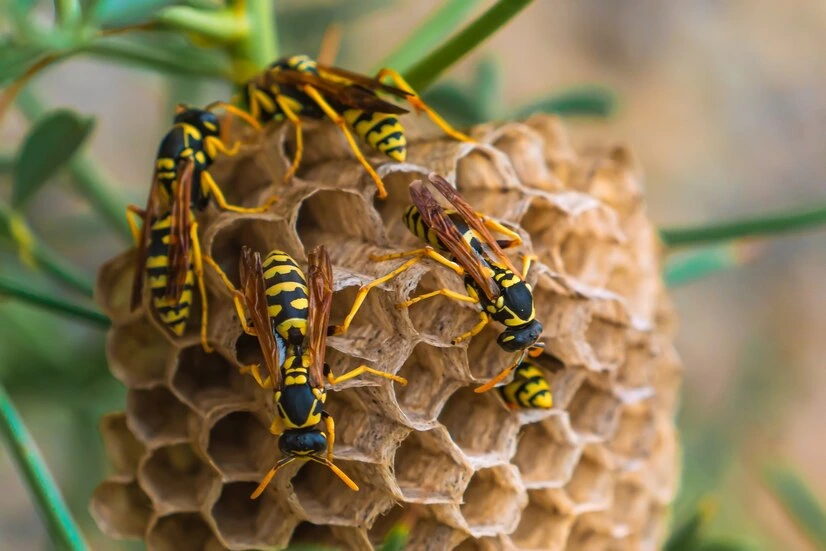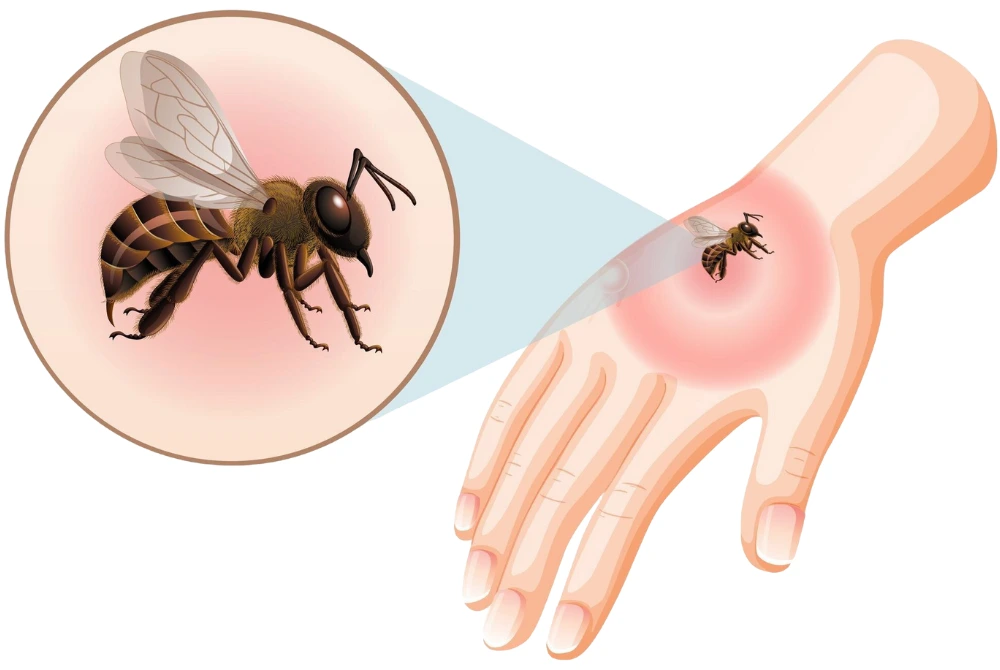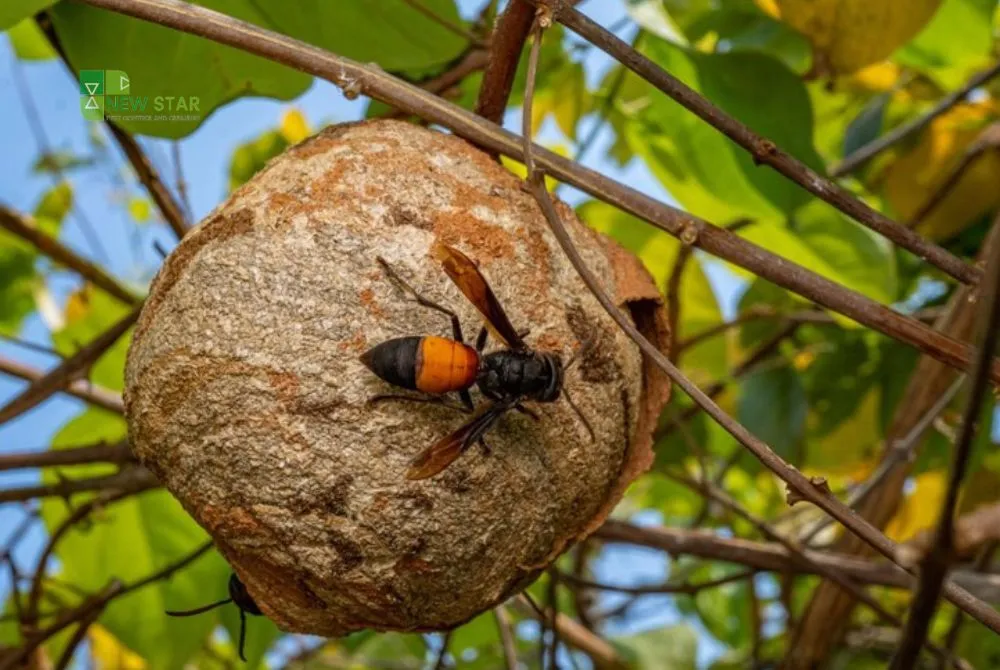Hornets, often mistaken for large wasps, are among the most intimidating stinging insects due to their size and aggressive nature. While they play an essential role in ecosystems by controlling other insect populations, their presence around humans can raise serious safety concerns. This guide explores the dangers posed by hornets, their behavior, and how to handle an encounter safely. let’s discuss here are hornets dangerous?
What Are Hornets?
Hornets are a subset of wasps, primarily belonging to the genus Vespa. They are typically larger than common wasps, with some species growing up to 2 inches long. Hornets are social insects that live in colonies, building paper-like nests from chewed wood fibers. These nests are often found in trees, bushes, attics, or under eaves.

Common Hornet Species:
- European Hornet (Vespa crabro): Found in North America and Europe.
- Asian Giant Hornet (Vespa mandarinia): Also known as the “murder hornet,” native to Asia.
- Bald-Faced Hornet (Dolichovespula maculata): Common in North America and known for its white facial markings.
Are Hornets Dangerous to Humans?
Hornets can be dangerous, primarily because of their powerful sting, aggressive behavior when threatened, and the potential for allergic reactions. So hornets are dangerous sometimes. Hornet poison can be injurious to death. Here are the key risks associated with hornets:
1. Painful and Toxic Sting
Hornet stings are more painful than those of bees or smaller wasps due to the larger amount of venom injected. Their venom contains acetylcholine, which amplifies pain, and other toxic compounds that can cause swelling, redness, and irritation.
2. Risk of Multiple Stings
Unlike bees, hornets can sting multiple times without dying. If their nest is disturbed, hornets may attack in groups, delivering multiple painful stings.
3. Allergic Reactions
For some individuals, hornet stings can trigger severe allergic reactions, including anaphylaxis. Symptoms include difficulty breathing, swelling of the throat, rapid heartbeat, and dizziness. Immediate medical attention is required in such cases.
4. Aggressive Behavior
Hornets are generally not aggressive unless provoked. However, they are highly territorial and will defend their nests aggressively if they sense a threat.
Are Hornets Beneficial to the Environment?
Despite their dangers, hornets play a vital role in ecosystems. They are natural predators that feed on harmful pests, such as caterpillars, flies, and other insects. This makes them beneficial for controlling pest populations in gardens and agricultural areas.
How to Identify a Hornet Infestation
Hornet infestations can pose significant risks, especially if their nests are located near human activity. Look for these signs:
- Visible Nests: Paper-like structures often found in trees, shrubs, or sheltered areas.
- Increased Activity: Frequent sightings of large stinging insects around your property.
- Audible Buzzing: A persistent humming or buzzing sound near their nesting area.
What to Do If You Encounter Hornets
1. Stay Calm and Avoid Sudden Movements
If you see a hornet nearby, do not swat at it or make sudden movements. This can provoke an attack.
2. Keep Your Distance from Nests
Avoid approaching or disturbing a hornet’s nest. If the nest is in a high-traffic area, contact a pest control company in Dubai acetylcholineto to handle its removal safely.
3. Protect Yourself Outdoors
When working in gardens or wooded areas, wear protective clothing and avoid wearing sweet-smelling perfumes or bright colors that may attract hornets.
4. Use Insect Screens
Install insect screens on windows and doors to prevent hornets from entering your home.
How to Handle Hornet Nests
Removing a hornet nest on your own can be extremely dangerous. Here’s what you should know:
1. Call a Professional
Professional pest control services have the tools and expertise to safely remove hornet nests without endangering you or your family.
2. Avoid DIY Removal
Using sprays or attempting to knock down a nest can provoke the hornets, leading to attacks. Leave nest removal to experts.
When to Seek Medical Help After a Hornet Sting
While most hornet stings can be treated at home, seek immediate medical attention if you experience:

- Severe swelling beyond the sting site.
- Difficulty breathing or swallowing.
- Dizziness or fainting.
- Rapid or irregular heartbeat.
For mild stings, clean the area with soap and water, apply a cold compress to reduce swelling, and take an antihistamine to alleviate itching.
How to Prevent Hornets on Your Property
1. Eliminate Food Sources
Hornets are attracted to sugary foods and drinks. Keep trash bins sealed and clean up spills promptly.
2. Maintain Your Property
Trim overgrown trees and shrubs, as these can provide nesting spots. Regularly inspect your home for potential entry points, such as cracks or gaps.
3. Use Decoy Nests
Hornets are territorial and often avoid areas with existing nests. Hanging a decoy nest may deter them from building one nearby.
Hornets can be dangerous if provoked, but understanding their behavior and taking appropriate precautions can minimize risks. If you encounter a nest or notice an infestation, do not attempt to handle it yourself. Contact a professional pest control service to address the problem safely. Contact New Star to avail yourself of wasp control services in Dubai.
By staying informed and prepared, you can coexist with these vital insects while keeping your home and family safe.

